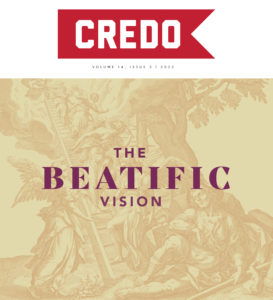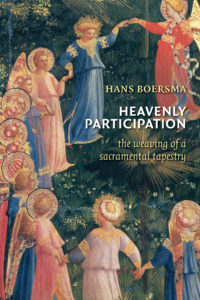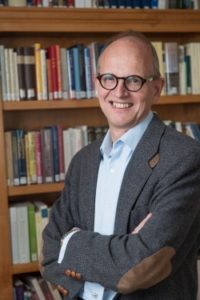
10 Questions with Hans Boersma
L ots of Christians regularly pray, read the Bible, attend worship services, and take the Lord’s Supper. But how many of them still struggle to articulate exactly how it is that they enjoy communion with the Triune God? Thanks to the excellent theological retrieval done by Hans Boersma and others, Christians are being urged to reconsider metaphysics to recover a participatory understanding of being, and in turn, a sacred view of the world. To learn more about this theological retrieval project, Credo Editor Lance English sat down with Hans Boersma to ask him 10 questions about metaphysics, ressourcement, and the local church.
ots of Christians regularly pray, read the Bible, attend worship services, and take the Lord’s Supper. But how many of them still struggle to articulate exactly how it is that they enjoy communion with the Triune God? Thanks to the excellent theological retrieval done by Hans Boersma and others, Christians are being urged to reconsider metaphysics to recover a participatory understanding of being, and in turn, a sacred view of the world. To learn more about this theological retrieval project, Credo Editor Lance English sat down with Hans Boersma to ask him 10 questions about metaphysics, ressourcement, and the local church.
1. You embody a desire to retrieve the “sacramental ontology” of the pre-modern tradition. What do you mean by “sacramental ontology.”
In the modern period, we tend to define the world around us by what we observe, which is to say, empirically. Often, we do not go beyond the world of the senses. But the premodern world saw this-worldly, material things (the objects that we perceive empirically) as related, or linked to greater, other-worldly, spiritual realities.The presence of the Word of God in creation is a real presence, not just an imaginary presence. Click To Tweet Everything that we observe, for a premodern mind, was connected sacramentally to the eternal Logos or Word of God, in which they all cohere. If this is the correct perspective (which I think it is), then everything we observe with the senses is like a small-s sacrament, in which the Logos makes himself present in some way. This presence of the Word of God in creation is a real presence, not just an imaginary presence. So, the presence of God in the world is sacramental. A view of the world (an ontology) that assumes this participatory or real link between heaven and earth is sacramental—hence the phrase “sacramental ontology.”
2. How does the language of “participation” help us grasp the nature of what it means to be a Christian?
I already dropped the word “participation.” This language affirms that things of this world have their being or existence not of themselves but by participating in the eternal Word of God. This claim is important for our everyday lives, for it means that we affirm that the created world is sacred, and that we should treat it as sacred—as sharing, in some way, in the being of God. What is more, our role as human beings involves serving as priests for all of creation. We should guide the world around us—including other human beings—to participate more deeply in the life of God. So, participation language allows us to define our calling or role in the world more clearly. Our calling is always to “lift up” or “hierarchize” (as Dionysius once put it) the cosmos into the life of God. Most important tools for retrieval? Careful Bible reading, prayer, as well as humble and receptive reading of our theological predecessors. Click To Tweet
already dropped the word “participation.” This language affirms that things of this world have their being or existence not of themselves but by participating in the eternal Word of God. This claim is important for our everyday lives, for it means that we affirm that the created world is sacred, and that we should treat it as sacred—as sharing, in some way, in the being of God. What is more, our role as human beings involves serving as priests for all of creation. We should guide the world around us—including other human beings—to participate more deeply in the life of God. So, participation language allows us to define our calling or role in the world more clearly. Our calling is always to “lift up” or “hierarchize” (as Dionysius once put it) the cosmos into the life of God. Most important tools for retrieval? Careful Bible reading, prayer, as well as humble and receptive reading of our theological predecessors. Click To Tweet
3. Why should Christians be concerned with metaphysics?
Everyone does metaphysics. The question is not, Should we do metaphysics? But, What kind of metaphysics should we embrace? We live in a modern, anti-metaphysical age, which tells itself the story that we can get on with life without doing metaphysics. But this is a deeply problematic, deceptive stance. The reality is that, awares or unawares, we all assume a particular kind of metaphysic. People that object to Christian Platonism, saying they don’t believe in metaphysics, typically operate with a modern, anti-realist metaphysic, in which separate, atomized, material objects are they only things they will acknowledge as real. That kind of metaphysic is really quite reductive. So, in discussion, I always try to push people to acknowledge their hidden assumptions—the metaphysic with which they operate.
4. Who have been your most formative influences in theology and ministry?
I would say Henri de Lubac, the twentieth-century Jesuit patristic scholar, has been the most formative for me. His understanding of participation, his reading of the church fathers, and especially his reappropriation of spiritual exegesis is profound, and has deeply shaped my reading of Scripture and my entire metaphysical outlook. Beyond de Lubac, Yves Congar’s view of tradition (and its relation to Scripture) has also been important to me. It helped me leave behind a sola scriptura view and acknowledge the inescapable intertwining of Scripture and tradition—and as a result, I’ve come to have a much more receptive, appreciative attitude toward the Christian past.
5. What has been your favorite book to write?
I’m not sure. I’ve just finished writing a book on meditative reading (lectio divina), called Pierced by Love, and I thoroughly enjoyed writing it. Perhaps because I just finished that one and it’s fresh in my mind, I’m inclined to say I enjoyed writing that one the most. At the same time, I also really enjoyed writing Heavenly Participation. I had just finished a more academic book on twentieth-century Catholic thought, and Heavenly Participation is a somewhat popular reworking of key points I had already learned through my more academic project. This meant that I was able to write Heavenly Participation quite quickly. It’s the book I spent the least time on in terms of actually writing it. So, this book too is a contender for my favorite book to write—simply because it came to me most easily.

